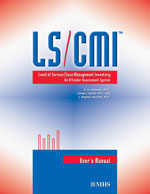
Hare PCL-R™: 2nd Ed.
Hare Psychopathy Checklist-Revised: 2nd Edition
Assesses Psychopathic Personality Disorders in forensic populations
Filters
The second edition of the Hare Psychopathy Checklist-Revised (Hare PCL–R™: 2nd Ed.) supplants its predecessor as the mandatory tool for assessing psychopathy. Using it, you will find forensic assessments of psychopathy to be systematic and based on ironclad data and research. This revision draws upon numerous articles, reports, presentations, and dissertations that have appeared since publication of the original Hare PCL–R in 1991.
Age
- 18 and Older
Administration Type
- Professional
- Interview
Administration Time
- Structured interview: 90 to 120 Minutes
- Collateral Review: 60 Minutes
- PCL-R assessment: 15 to 20 Minutes
Number of Items
- 20
Qualification Level
- C
Format(s)
- Handscored
- Software (Administration & Scoring)
Profile Reports summarize the results of an individual administration, providing scores for all scales.
PCL–R: 2nd Edition Rating Booklet
The PCL–R: 2nd Edition Rating Booklet contains all of the information needed to administer and score the PCL–R. The Rating Booklet provides an accessible format to consult the rating criteria for each of the 20 PCL–R items.
PCL–R: 2nd Edition Interview Guide
The PCL–R: 2nd Edition Interview Guide includes the interview questions recommended to elicit information for the PCL–R.
PCL–R: 2nd Edition QuikScore™ Form
The clinician-completed QuikScore™ Form is a self-scoring form used to record the ratings of the individual on each of the 20 PCL–R items. No separate templates or keys are needed, as the QuikScore Form automatically transfers the rating to a scoring grid. The ratings can then be used to obtain scores and convert them into T-scores.
The PCL–R assesses Psychopathic Personality Disorders in forensic populations. It provides complete coverage of each domain of psychopathic traits and behaviors. As in the original version, the PCL–R: 2nd Edition provides a total score that is the most important score for the overall assessment of psychopathy. The total score can be interpreted dimensionally in terms of degree of match to the prototypical psychopath, or it can be used categorically to help identify/diagnose psychopaths. Ratings are made using a structured interview and a review of collateral information. Scoring is based on the degree to which an individual’s personality and behavior match the items in the Rating Booklet.
The PCL–R: 2nd Edition is available in handscored and software formats. With the handscored format, you complete the assessment with an Interview Guide, a Rating Booklet, and a QuikScore Form. With the software format, you can instantly generate a Profile Report upon completion of the assessment.
Widely accepted as the definitive resource in assessing Psychopathic Personality Disorders, the Hare PCL–R is commonly used in research with criminal offenders and forensic psychiatric patients. Although the items and scoring criteria are unchanged, this second edition contains new information and a large amount of data for establishing comparison tables and descriptive statistics for selected groups, as well as for addressing issues of reliability, validity, and generalizability, due to the dramatic surge in published theory and research on psychopathy. New research findings derived from confirmatory factor analysis and item response theory are presented, as well as the implications of these findings for research, clinical, and forensic purposes. Detailed data presented in the manual include construct validity; item reliabilities, interrater reliability and internal consistency reliability; reliability of total, factor, and facet scores, as well as standard error of measurement; correlation of the Hare PCL–R: 2nd Edition with self-report measures, clinical assessments of psychopathy, personality scales, anxiety scales, and demographic variables; descriptive statistics for samples; and item response theory analyses.
In this second edition, the data sample was obtained from a total of 10,896 justice-involved individuals and patients. Pooled samples for male justice-involved individuals, male forensic psychiatric patients, and female justice-involved individuals were used to calculate the Hare PCL–R percentiles and T-scores for total and factor scores. Descriptive statistics are available for assessments conducted with the standard procedure (interview and file information) and for file reviews only. The standard assessment sample included 5,408 male justice-involved individuals, 1,246 male forensic psychiatric patients, and 1,218 female justice-involved individuals. The sample for file reviews included 2,622 male justice-involved individuals and 402 male forensic psychiatric patients. Complete norming information and sample details are provided in the Hare PCL–R: 2nd Edition Technical Manual.
